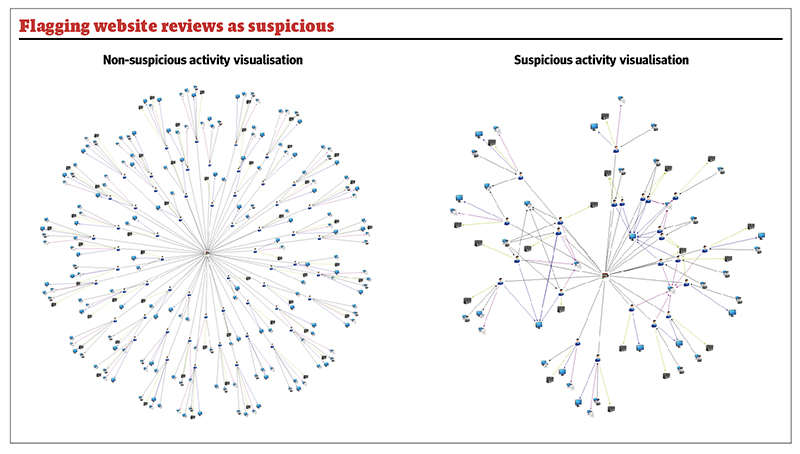Finding the fraudsters: How TripAdvisor spots fake reviews
A TripAdvisor ranking can be make or break for a hospitality business. Some operators are buying positive reviews to boost their business, but the website is cracking down. Emma Lake reports
Earlier this year, a man was jailed for nine months in Italy after being convicted of selling fake TripAdvisor reviews to hundreds of hospitality companies.
The landmark ruling marked the first time a court had jailed someone for review fraud, and while TripAdvisor hopes other jurisdictions will be inspired to join Italy in dishing out harsh penalties, its team is focused on its own fight against those attempting to manipulate its ranking system.
The challenge for TripAdvisor is to ensure that paid-for reviews posted by such set-ups never appear on its website. Itâs a big task â" the site hosts more than 600 million reviews â" but director of corporate communications James Kay says less than 2% of reviews that do make it to the site are ever flagged (for any reason) as suspicious.
Kay suggests that the lack of paid reviews (see below for TripAdvisorâs review definitions) being flagged may reflect the fact that there is no incentive for fraudsters to follow through on sales. He explains: âThere are loads of websites who will claim theyâre selling reviews but actually when it comes down to it, theyâre not even attempting to write them.
âIf you think about it, they have no incentive to: itâs illegal, and itâs illegal to buy a review in the UK, so if youâre an owner and you pay money to a website for a package of reviews and they donât deliver, you have absolutely no recourse. Theyâre not going to give you a refund, and itâs not like theyâre relying on repeat custom. They have absolutely no incentive to deliver on the promise.â
Those that do follow up sales with action will have to get around TripAdvisorâs software to see their posts go live. The software analyses factors such as location, time, device and IP address for warning signs. Before making it on to the site, every review flagged is looked at by TripÂAdvisorâs fraud busters, who are based around the world providing 24-hour cover.
The analysis done by the company is based on its experience of what the posting activity for genuine reviews of a single property will typically look like, and Kay says that deviations from this are fairly easy to notice.
He explains: âThe reason we think our technology is so effective is because of the patterns, even at a small scale, even just a few reviews. Very few fake reviewers are trying to get one review up in isolation. If their motive is to move a businessâs rating, then a single review isnât going to do that. So theyâre posting multiple reviews, and thatâs where those connections become more and more obvious and how our investigators can unravel things.â
For this reason, the more prolific a fraudster is, the more likely they are to be noticed. Once TripAdvisor has identified paid reviews related to one property, it can quickly find more.
âI would compare it to pouring water on a spider web,â Kay explains. âYou suddenly see all the elements to it. It absolutely is the case that once you establish one property is using paid reviews and you are confident the reviews coming in for it are not legitimate, you can be confident in others. Thatâs an incredibly powerful tool for us; once we have that, the whole thing can come down very quickly.â
Caught out
It can be a game of cat and mouse, with some fraudsters employing sophisticated measures to try and negotiate a way through TripÂAdvisorâs systems. Kay says: âFraudsters are always trying to find new ways to get around the system, which we are obviously very hot on.
âSomething we saw in Russia [around the 2018 World Cup] was review exchange. Groups where people will say, âIâll write a positive review for your business if you write one for mineâ. Itâs not actually the most sophisticated fraud; itâs something our data can pick up pretty quickly. We can infiltrate these groups, posing as a business owner, and offer to do the same thing.â
The investigation into activity around the World Cup saw more than 1,300 reviewer accounts identified as attempting to submit reviews in a suspicious manner. These reviews were directed at 250 different restaurants across the tournamentâs 11 host cities.
As well as monitoring patterns, the company carries out proactive investigations by searching for companies advertising their services.
Kay says: âTo get custom, they have to advertise and so thatâs a big way weâre able to catch them. If theyâre advertising to owners then theyâre visible, and what our investigators will do is pose as business owners and enquire about purchasing a package of reviews. Weâre gathering information.â
Collecting this information may mean that TripAdvisor waits a while before sending a cease and desist letter â" an action that will normally result in such websites being taken down. Reviews from the site will still be blocked, but Kay explains the company may not want to reveal its hand too early so it has the opportunity to gather information that can help it monitor the fraudsterâs activity.
Kay says: âThe danger is if we immediately send a cease and desist letter, all we do is alert them to the fact weâre on to them, and they shut down the site, set up one in a different name, and weâve got to start from scratch.
âIf we establish dialogue when they donât even know theyâre in conversation with us and glean information about the person behind the website, then when it does come to showing our hand, if they shut it down and set up a new one we can probably identify it fairly quickly.â
A cloud of suspicion
According to Kay, there are huge variations in the presentation, sophistication and pricing of the paid review companies.
He explains: âSome are very blatant and not very sophisticated in the way they market themselves. Sometimes they will post listings on Fiverr and eBay, and weâve worked with these sites to have them taken down.
âThe first stage of any investigation is to work out what weâre dealing with: is it one thatâs all smoke and mirrors, or is it one that is trying to post reviews? The more sophisticated fraudsters who have created full websites often try to claim that theyâre affiliated to TripAdvisor or have an insider who used to work here. That is always a lie; we would never work with anyone in that way.â
Dialogue is also what TripAdvisor wants to establish with any businesses that have tried to purchase positive reviews.
âThere are penalties if TripÂAdvisor finds you are using a paid review service,â he explains. âHow strict that penalty is will depend on a whole number of factors. Itâs done on a case-by-case basis and the businesses that co-operate with us donât face penalties as harsh as those that donât.â
TripAdvisorâs harshest punishment is a red badge that will sit on a businessâs page, advising all those that visit it that the reviews cannot be trusted. Kay advises that this is something that is ârarelyâ required.
TripAdvisor hopes more review fraudsters will end up in court as it works to provide a level playing field that businesses and consumers can trust.
âItaly was a landmark case,â Kay says. âWe were able to take it all the way to the court because of the policeâs willingness to take it up. They were investigating while we were investigating in tandem, and when we became aware of that we were able to join the case as a civil claimant and provide the evidence we had gathered. It amounted to thousands of reviews â" a lot of which we had stopped from making it on to the site. It was fantastic to see someone put in jail for it because it is fraud, it is illegal, and we hope that it is a landmark case and that others will follow suit.â
TripAdvisorâs review definitions
Fake review
A review submitted by someone who is either biased or did not have a personal experience with the business that they are reviewing
Contested review
A review submitted by someone who did have a personal experience with the business, but whose account of that experience is disputed by the business
Paid review
A review that a business has attempted to purchase
Incentivised review
A review given on the promise of a reward or preferential treatment, such as discount
Blackmail
An attempt to threaten a business with a bad review in exchange for a discount/refund or preferential treatment
Employee or family review
A reviews posted by anyone who is affiliated with the business
Competitor review
A review posted by someone associated with a business in the surrounding area
Owner of company selling fake TripAdvisor reviews jailed >>
Wake-up call: how to deal with threats of bad reviews >>


















